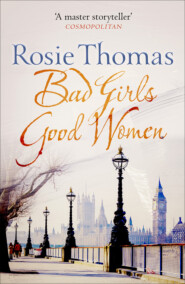По всем вопросам обращайтесь на: info@litportal.ru
(©) 2003-2025.
✖
Rosie Thomas 3-Book Collection: Moon Island, Sunrise, Follies
Автор
Год написания книги
2019
Настройки чтения
Размер шрифта
Высота строк
Поля
Like tonight when we were arguing, about nothing at all, just what time I should come in on Saturday nights, and I couldn’t keep up the control: I felt the real me speaking.
Not shouting or any of that stuff. Just cold and quiet and sure. I said I didn’t care, their rules didn’t touch me, nothing really touches me except things they would never know about.
I could see Mom staring at me like I’m an alien. And fear in her face that she kept trying to rub out.
She said did I want to talk, I could trust her, I could tell her anything I wanted.
And I had to keep my mouth still to stop it making this crazy smile. Because I know what I am and what I have, and I know what I hold on to, and it’s nothing I could tell. Never.
Sometimes just the knowledge, the memory of it does make me feel so strong. Like I could hike up the highest mountain or live alone on a deserted island – oh, an island – just with this for food and drink and warmth and company.
And if I’m truthful there are other times when I doubt it all. All the wishing and waiting. Miss Straight-A says in my head, who are you kidding?
But it’s easy to quieten her. And the easiness makes me sure that I’m real and what I have experienced is real.
And then I feel happy.
After that there was a long sequence of numbers, scribbled and jumbled close together so that the hasty digits were barely legible. They looked as if they had been written in high passion.
Because May read too quickly she sometimes missed the sense, so she went back and made herself study each line. After a while she yawned, and the yawn caught in the back of her throat and swelled into a greasy surge of nausea.
She realised that the diary frightened her.
It was the combination that was unnerving. The way the accounts of normal everyday experiences were linked by the fierce jumbles of numbers to the passages of declaration. And Doone’s declarations of strength made her uneasy. If she was so strong and happy, why did she keep writing it down and why did what she wrote make her sound so lonely? What secret was hidden in the numbers?
May looked at them again. They were usually groups of three, sometimes only two. Once or twice the same number or similar ones occurred several times close together, but otherwise there was no apparent link or pattern. If it was a code, she had no idea how to break it. The thought of what the numbers might spell out increased the sick pressure so that May wondered if she might actually vomit. Holding her legs tensed against the chair’s worn slipcover she closed the book and waited.
Slowly the nausea subsided, but she couldn’t get Doone’s words out of her head. I could never tell. I could live on a desert island with nothing but this for food and warmth and company. It made her sound so isolated. And yet, May thought, I know her. This bed was where she had slept. From the window she had looked at the view of the island and had gone out and drowned in the blue water.
Somehow, with her diary and her introspection and her coded secrets – and her loneliness – Doone Bennison was slipping under her skin. Now that the knowledge of her was there, hooked in beneath the surface, May did not know how she might rid herself of it. She remembered how finding the diary had made her feel that she hugged the secret to herself like a shield.
Perhaps I’m like her, she thought. As if she were looking down from some vantage point up under the cracked ceiling, she saw herself sitting splay-legged in the old chair, with the closed diary in her lap and the chair wedged up close against the door to keep out intruders. Or, maybe, was it Doone she was seeing and not herself at all?
‘I would tell my mother,’ May said. The words sounded startlingly loud in the enclosed room. ‘I wish I could tell her.’
One grey, sleet-filled afternoon in the weeks after Alison’s death, driven by an impulse she didn’t understand, May had gone to the boxes where John had stored her clothes. She had taken out the dresses and jackets one by one and cut them, making long tattered ribbons, with the kitchen shears. ‘See?’ she had angrily demanded as she did it. ‘Do you see what I’m doing?’
She hadn’t expected her mother to hear the question, or to be hurt by the destruction of her clothes. Nor had the frenzy been a relief, only another shame to add to the ones May was suffering already.
The therapist John took her to see after this episode had advised May to search for something in nature that reminded her of her mother, and to look at it and think about her when she felt overwhelmed by grief or anger. Reluctantly May had chosen a tree, one particular tall, graceful tree, which grew in a little park near to their house, and in a way the strategy had worked. She thought of it secretly as Mom’s tree and tried in a stilted way to address her mother through it. Now she felt a sudden urge to run out and put her arms around the rough trunk.
There didn’t seem to be much variety in the trees around here. They were mostly hostile pointed firs.
May jumped to her feet and the diary fell to the floor. She shoved it back into the hole and clumsily wedged the skirting back in place, then pulled the chair away from the door. She didn’t have to trap herself in this room. Ivy was with Lucas but she could try her father. There were enough reasons why she didn’t usually turn to him, but she dismissed those for this moment.
May ran down the steep stairs. As her head came below the upper floor level she saw that he had come in from tennis; he was in the kitchen with Leonie Beam. The corners of the room were thrown into deeper shadow by the slices of light that angled from the windows. Dust specks floated in the sunlight, making the old beams and the blackened hearthstones seem darker and heavier.
John was making coffee in the old-fashioned percolator. Leonie was leaning against one of the counters. She was wearing white tennis shorts and shoes, and her long legs were crossed at the ankles. Both of them looked up at May in momentary surprise and smiled at her.
‘Hi,’ John said. ‘I wondered where you were. We had a good game, Leonie and I won both sets.’
Her smooth dark hair was damp, sticking to her forehead, and his shirt was darkened in a great patch across his chest. The two of them were smiling in exactly the same way – the neutral way that covered up other things. May had interrupted something.
‘Do you play tennis, May?’ asked Leonie.
‘No. I can’t think of anything more boring.’
‘May …’ John began, but she didn’t wait to hear him out. She marched across to the porch screen and slammed it open, leaving it gaping behind her.
After a second’s awkward silence Leonie gently closed the screen again. She took the mug of coffee that John handed to her.
‘Sorry,’ John said shortly.
‘No need.’
The child had materialised like some avenging angel. Her eyes had skewered them both, as if she could have uttered something much worse than mild rudeness. But her reaction at the sight of them had been so quick that Leonie knew jealousy was a familiar feeling for her. John must have plenty of girlfriends. Not surprising, she thought with resignation.
‘May didn’t like Suzanne, the woman I was involved with until recently. Neither did Ivy, really, although it mattered less to her.’
‘I see,’ Leonie said. She sat down at the over-large oak table and looked through the window at the pillars of the porch and the sky, waiting for what he would say next.
Out on the deck May hesitated, blinking in the brightness, remembering the people down on the beach and her sister’s golden limbs twined around Lucas’s. There was no going back into the house either, so she slipped down the dank space that separated the Captain’s House from Elizabeth Newton’s garden. She moved quickly, because Elizabeth might be working with her pruning shears again amid the thick greenery. She didn’t want to talk to Elizabeth now, or even to be seen by her.
There was no way to go but round to the road side of the house. There was a path and dogwood bushes, and the open patch of grass and stones where John left the car. The Pittsharbor lane petered out here at the Captain’s House, the last building on the bluff.
May wandered slowly along the road. She hesitated at the sound of a car and saw a black Lexus coming round the bend. She thought it must be more members of the endless Beam family arriving, but the car slowed before their driveway and turned towards the house that stood between theirs and the Fennymores’.
The name on the mailbox was Stiegel. The occupants of the car were a couple, quite young. May waited in the shelter of the hedge. The car drew up at the door and the man got out. He had dark curly hair and wore smart New York clothes; a pink Ralph Lauren button-down shirt and polished shoes. There was a thick gold band on his wedding finger; she saw the light catch it as he opened the rear door of the car and unbuckled a baby seat. He swung the seat into the air, using two hands, as if it were a prize he had just been awarded. There was a fat, impassive-looking baby strapped into it. ‘Here we are,’ the man cooed into the baby’s face, ‘here we are at last. Was it a long way for her? A long way in the nasty car?’
The woman had got out too. She was big, May saw, and swathed in those no-colour linen clothes that some people try to hide their size inside. ‘Come on, open up the house, Marty,’ she said. ‘You know she needs her feed.’
Marty handed the baby over to her and ran up the steps to the door, tugging a bunch of keys out of a slim leather bag. He fumbled, then unlocked the door. He pushed it open and held it for the woman, who walked by with the baby lifted aloft in its seat. They all disappeared inside, but a minute later the man reemerged and began taking heavy bags from the trunk of the Lexus. May slipped out of her hiding-place and walked on aimlessly.
The Fennymores’ house was smaller than the other four. It was a plain box but the steep pitched roof and low windows made it look hunched, even forbidding. There was no suggestion of a garden, only a piece of open ground where their old tan station-wagon stood next to a dilapidated shed. Shading the car and the shed was a big tree. It had pale, almost silvery bark and branches like the fingers of an elegant woman’s hand. A sweep of leaves looked like the layers of a skirt.
May hardly knew one tree from the next, but she thought this one might be a kind of birch or maybe beech. It wasn’t exactly the same as the one in the park she called Mom’s tree, but it was quite similar. On an impulse she left the road and went to it. She rested the flat of her hand against the smooth, sun-warmed bark, then tipped her head forward so that her forehead touched it.
Alison had been tall and elegant like the tree. The rustling skirt of leaves was like one she had brought with her when she moved from England to New York in 1970. Alison had been a student of American history and part of her degree course had been a year at Columbia. She had met John Duhane sitting on a bench at the Frick and had stayed to marry him.
The skirt was made of watery tie-dyed cheesecloth, sea-green and jade, with a handkerchief-point hem sewn with tiny emerald beads. The beads had rolled and scattered as the scissor blades sliced the cheesecloth into tatters. Once, long before that, May had implored Alison to let her dress up in the skirt. She had worn it to a fancy dress party as a sea nymph and Alison had plaited green ribbons for seaweed in her hair.
May pressed her face against the bark of the new tree, but she couldn’t conjure up any words, for her mother or for anyone else. Instead, her shoulders heaved and her face contorted. She rolled and scraped her forehead against the tree as the tears came.
Aaron Fennymore had been in the shed, chiselling a new dowel to replace a split one from one of the old chairs. Hannah had been asking him for weeks to do it, and today he had felt enough of a lick of energy to attempt a job that once would have taken a matter of minutes. It was slow work now; the wood slipped in the vice and the mallet had grown almost too heavy to lift.
He saw the girl as soon as she walked in from the lane. He frowned at the sight of her, then stood with the mallet in one hand and the chisel in the other as she stretched out her arms to embrace a tree trunk. He let his spectacles slide down his nose. Old age had made him long-sighted and he could see the child’s face squeezed with suffering. Gently, he put down the tools.
She didn’t hear the creak of the shed door or his slow footsteps. When he asked, ‘Can I help?’ she leapt backwards, hand to her mouth to stifle a scream. ‘It’s all right,’ Aaron said.











